RMIT University: Information Law and Society - Privacy in Digital Age
VerifiedAdded on 2022/09/18
|14
|3253
|21
Report
AI Summary
This report delves into the critical debate surrounding the global right to privacy in the digital age, examining the interplay between information law and societal norms. It begins with an introduction to the concept of privacy and its significance, particularly in the context of rapidly evolving digital landscapes, including the sub-types of digital privacy. A comprehensive literature review explores the arguments for and against a global right to privacy, emphasizing the importance of data privacy as a fundamental human right. The report analyzes the ethical issues arising from new technologies and the challenges they pose to data protection. Furthermore, it examines the various reforms proposed to safeguard privacy in the digital age, including online privacy laws and the specific legislation in Australia, such as the Privacy Act (Cth) 1988, the Privacy and Data Protection Act 2014 (Vic), and the Health Records Act 2001 (Vic). The report concludes by synthesizing the key findings and implications of the digital age on the right to privacy.
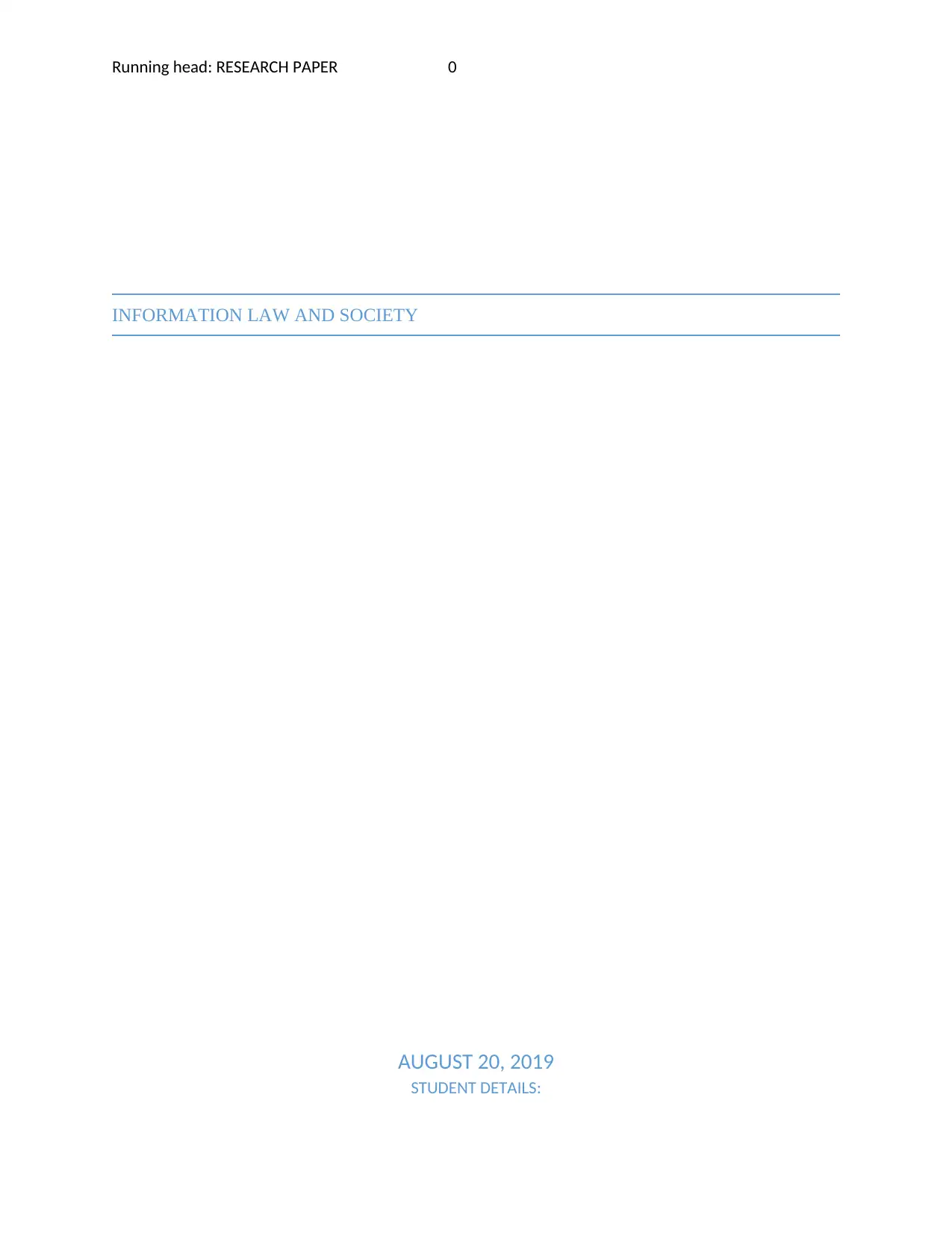
Running head: RESEARCH PAPER 0
INFORMATION LAW AND SOCIETY
AUGUST 20, 2019
STUDENT DETAILS:
INFORMATION LAW AND SOCIETY
AUGUST 20, 2019
STUDENT DETAILS:
Paraphrase This Document
Need a fresh take? Get an instant paraphrase of this document with our AI Paraphraser
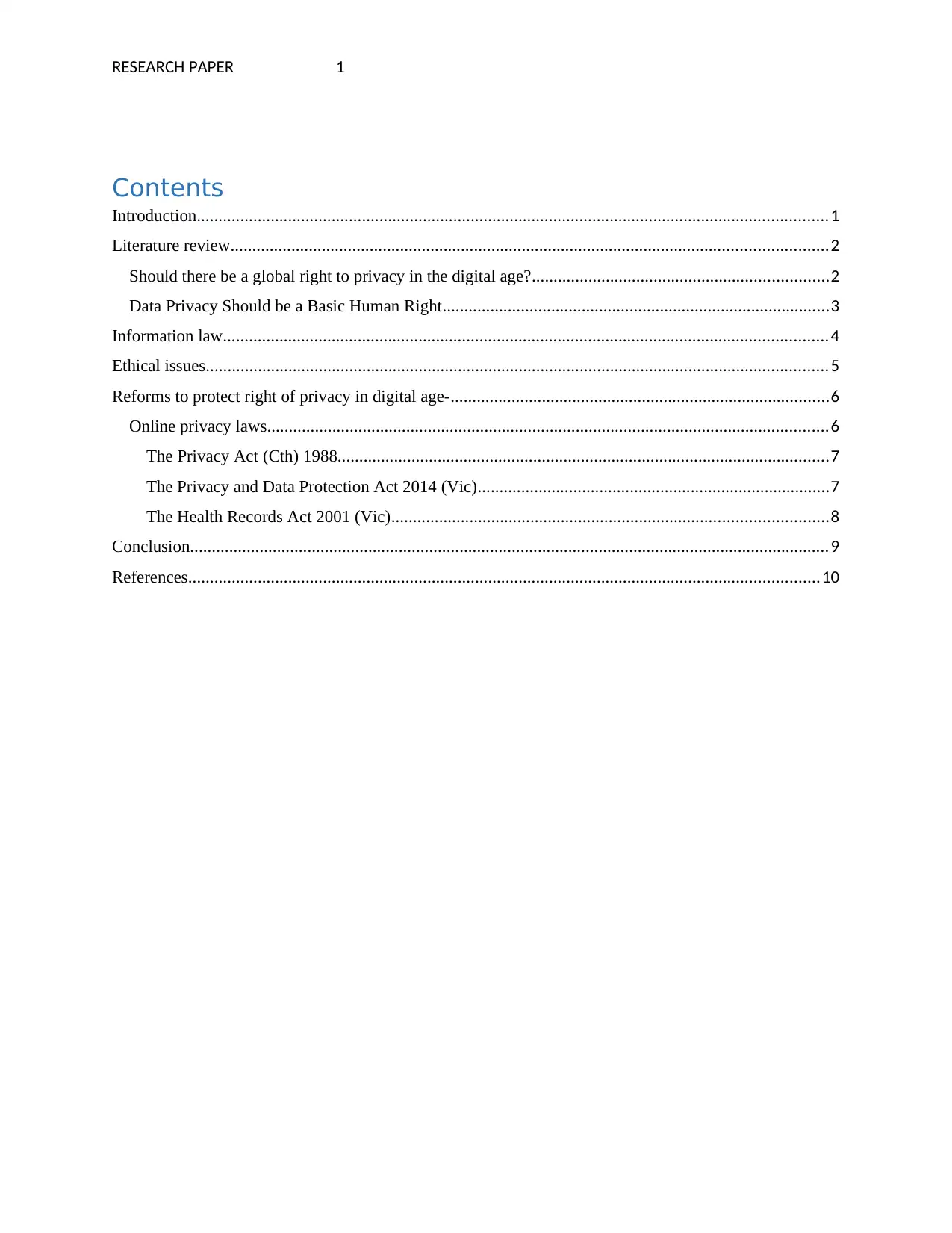
RESEARCH PAPER 1
Contents
Introduction.................................................................................................................................................1
Literature review.........................................................................................................................................2
Should there be a global right to privacy in the digital age?....................................................................2
Data Privacy Should be a Basic Human Right.........................................................................................3
Information law...........................................................................................................................................4
Ethical issues...............................................................................................................................................5
Reforms to protect right of privacy in digital age-.......................................................................................6
Online privacy laws.................................................................................................................................6
The Privacy Act (Cth) 1988.................................................................................................................7
The Privacy and Data Protection Act 2014 (Vic).................................................................................7
The Health Records Act 2001 (Vic)....................................................................................................8
Conclusion...................................................................................................................................................9
References.................................................................................................................................................10
Contents
Introduction.................................................................................................................................................1
Literature review.........................................................................................................................................2
Should there be a global right to privacy in the digital age?....................................................................2
Data Privacy Should be a Basic Human Right.........................................................................................3
Information law...........................................................................................................................................4
Ethical issues...............................................................................................................................................5
Reforms to protect right of privacy in digital age-.......................................................................................6
Online privacy laws.................................................................................................................................6
The Privacy Act (Cth) 1988.................................................................................................................7
The Privacy and Data Protection Act 2014 (Vic).................................................................................7
The Health Records Act 2001 (Vic)....................................................................................................8
Conclusion...................................................................................................................................................9
References.................................................................................................................................................10
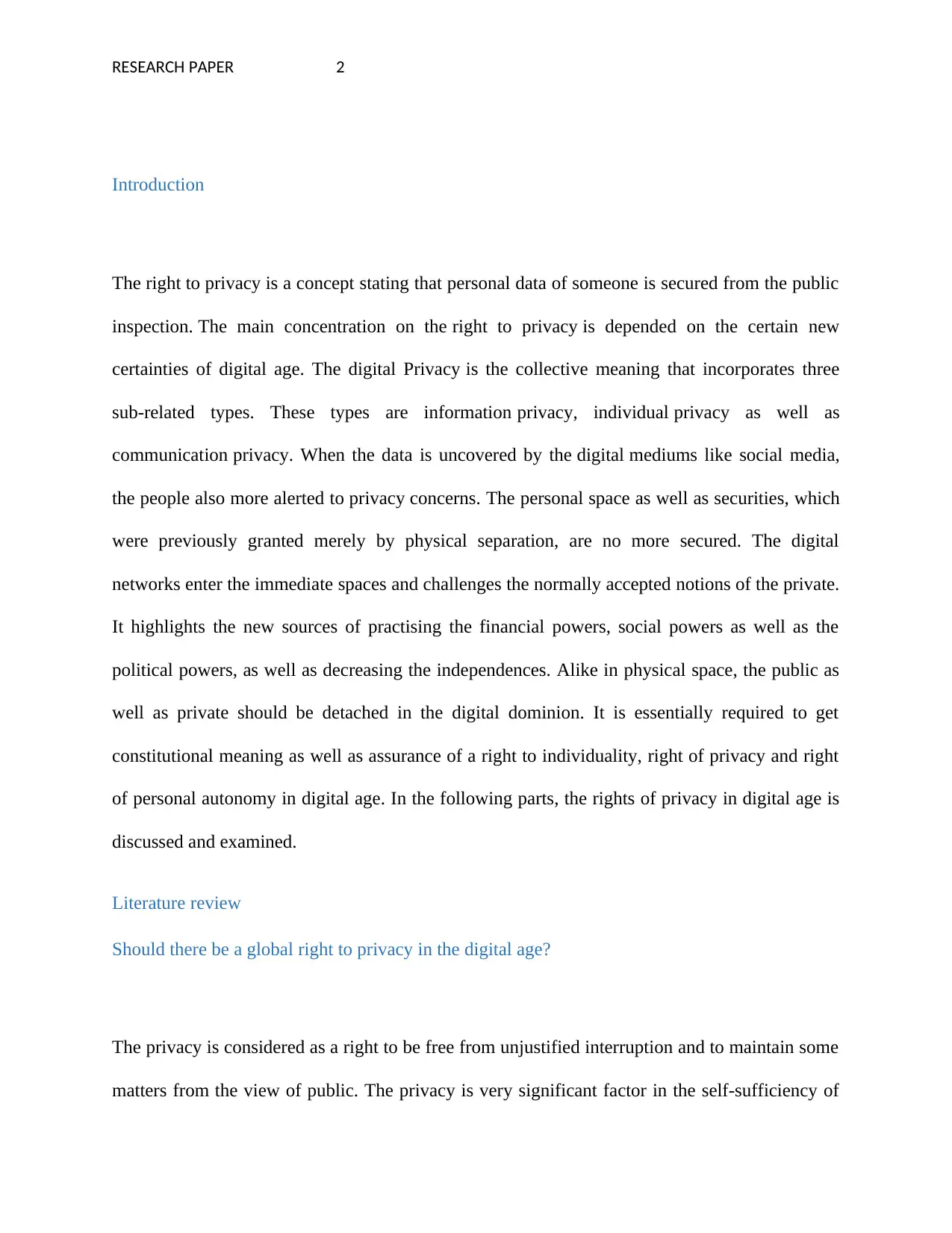
RESEARCH PAPER 2
Introduction
The right to privacy is a concept stating that personal data of someone is secured from the public
inspection. The main concentration on the right to privacy is depended on the certain new
certainties of digital age. The digital Privacy is the collective meaning that incorporates three
sub-related types. These types are information privacy, individual privacy as well as
communication privacy. When the data is uncovered by the digital mediums like social media,
the people also more alerted to privacy concerns. The personal space as well as securities, which
were previously granted merely by physical separation, are no more secured. The digital
networks enter the immediate spaces and challenges the normally accepted notions of the private.
It highlights the new sources of practising the financial powers, social powers as well as the
political powers, as well as decreasing the independences. Alike in physical space, the public as
well as private should be detached in the digital dominion. It is essentially required to get
constitutional meaning as well as assurance of a right to individuality, right of privacy and right
of personal autonomy in digital age. In the following parts, the rights of privacy in digital age is
discussed and examined.
Literature review
Should there be a global right to privacy in the digital age?
The privacy is considered as a right to be free from unjustified interruption and to maintain some
matters from the view of public. The privacy is very significant factor in the self-sufficiency of
Introduction
The right to privacy is a concept stating that personal data of someone is secured from the public
inspection. The main concentration on the right to privacy is depended on the certain new
certainties of digital age. The digital Privacy is the collective meaning that incorporates three
sub-related types. These types are information privacy, individual privacy as well as
communication privacy. When the data is uncovered by the digital mediums like social media,
the people also more alerted to privacy concerns. The personal space as well as securities, which
were previously granted merely by physical separation, are no more secured. The digital
networks enter the immediate spaces and challenges the normally accepted notions of the private.
It highlights the new sources of practising the financial powers, social powers as well as the
political powers, as well as decreasing the independences. Alike in physical space, the public as
well as private should be detached in the digital dominion. It is essentially required to get
constitutional meaning as well as assurance of a right to individuality, right of privacy and right
of personal autonomy in digital age. In the following parts, the rights of privacy in digital age is
discussed and examined.
Literature review
Should there be a global right to privacy in the digital age?
The privacy is considered as a right to be free from unjustified interruption and to maintain some
matters from the view of public. The privacy is very significant factor in the self-sufficiency of
⊘ This is a preview!⊘
Do you want full access?
Subscribe today to unlock all pages.

Trusted by 1+ million students worldwide
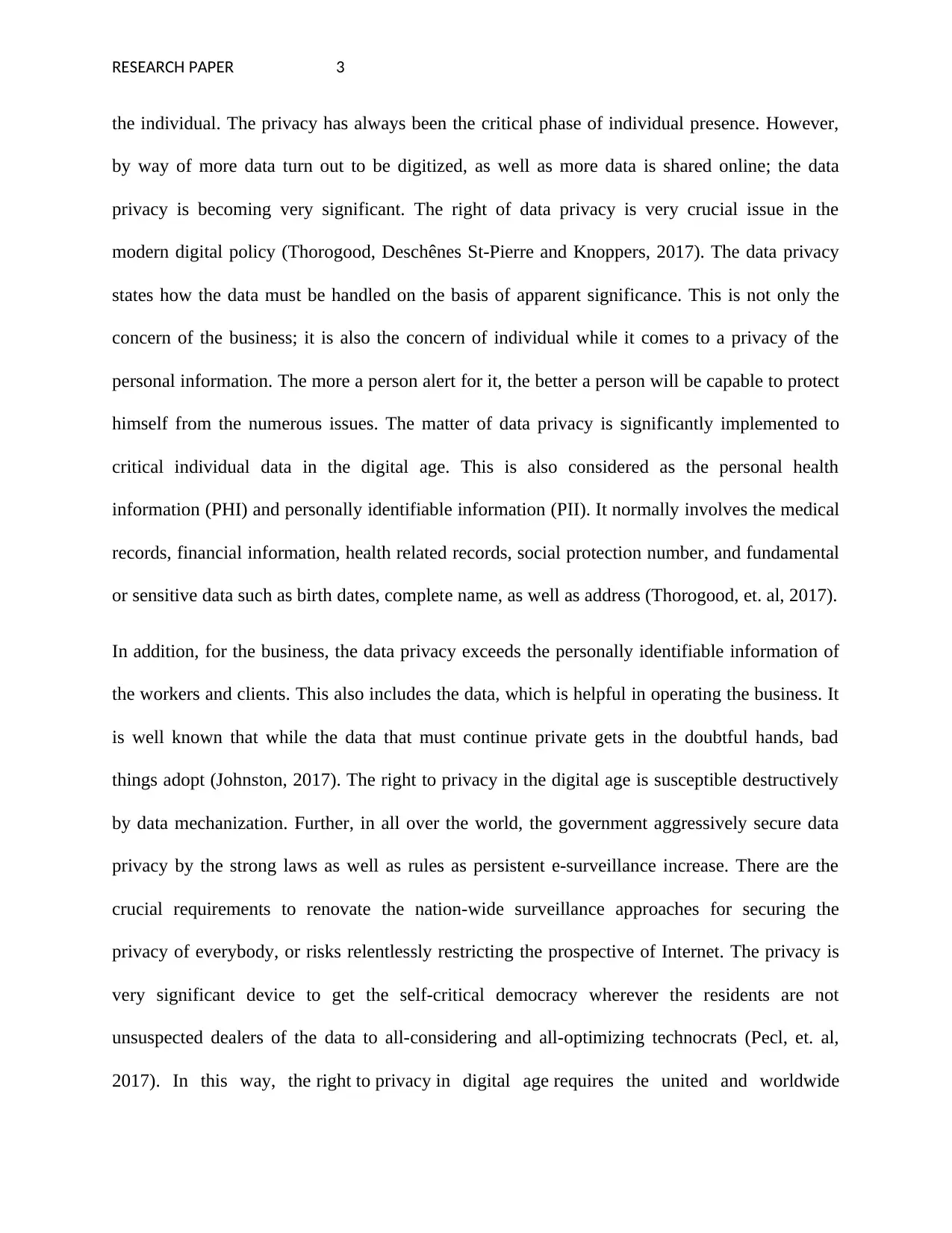
RESEARCH PAPER 3
the individual. The privacy has always been the critical phase of individual presence. However,
by way of more data turn out to be digitized, as well as more data is shared online; the data
privacy is becoming very significant. The right of data privacy is very crucial issue in the
modern digital policy (Thorogood, Deschênes St-Pierre and Knoppers, 2017). The data privacy
states how the data must be handled on the basis of apparent significance. This is not only the
concern of the business; it is also the concern of individual while it comes to a privacy of the
personal information. The more a person alert for it, the better a person will be capable to protect
himself from the numerous issues. The matter of data privacy is significantly implemented to
critical individual data in the digital age. This is also considered as the personal health
information (PHI) and personally identifiable information (PII). It normally involves the medical
records, financial information, health related records, social protection number, and fundamental
or sensitive data such as birth dates, complete name, as well as address (Thorogood, et. al, 2017).
In addition, for the business, the data privacy exceeds the personally identifiable information of
the workers and clients. This also includes the data, which is helpful in operating the business. It
is well known that while the data that must continue private gets in the doubtful hands, bad
things adopt (Johnston, 2017). The right to privacy in the digital age is susceptible destructively
by data mechanization. Further, in all over the world, the government aggressively secure data
privacy by the strong laws as well as rules as persistent e-surveillance increase. There are the
crucial requirements to renovate the nation-wide surveillance approaches for securing the
privacy of everybody, or risks relentlessly restricting the prospective of Internet. The privacy is
very significant device to get the self-critical democracy wherever the residents are not
unsuspected dealers of the data to all-considering and all-optimizing technocrats (Pecl, et. al,
2017). In this way, the right to privacy in digital age requires the united and worldwide
the individual. The privacy has always been the critical phase of individual presence. However,
by way of more data turn out to be digitized, as well as more data is shared online; the data
privacy is becoming very significant. The right of data privacy is very crucial issue in the
modern digital policy (Thorogood, Deschênes St-Pierre and Knoppers, 2017). The data privacy
states how the data must be handled on the basis of apparent significance. This is not only the
concern of the business; it is also the concern of individual while it comes to a privacy of the
personal information. The more a person alert for it, the better a person will be capable to protect
himself from the numerous issues. The matter of data privacy is significantly implemented to
critical individual data in the digital age. This is also considered as the personal health
information (PHI) and personally identifiable information (PII). It normally involves the medical
records, financial information, health related records, social protection number, and fundamental
or sensitive data such as birth dates, complete name, as well as address (Thorogood, et. al, 2017).
In addition, for the business, the data privacy exceeds the personally identifiable information of
the workers and clients. This also includes the data, which is helpful in operating the business. It
is well known that while the data that must continue private gets in the doubtful hands, bad
things adopt (Johnston, 2017). The right to privacy in the digital age is susceptible destructively
by data mechanization. Further, in all over the world, the government aggressively secure data
privacy by the strong laws as well as rules as persistent e-surveillance increase. There are the
crucial requirements to renovate the nation-wide surveillance approaches for securing the
privacy of everybody, or risks relentlessly restricting the prospective of Internet. The privacy is
very significant device to get the self-critical democracy wherever the residents are not
unsuspected dealers of the data to all-considering and all-optimizing technocrats (Pecl, et. al,
2017). In this way, the right to privacy in digital age requires the united and worldwide
Paraphrase This Document
Need a fresh take? Get an instant paraphrase of this document with our AI Paraphraser
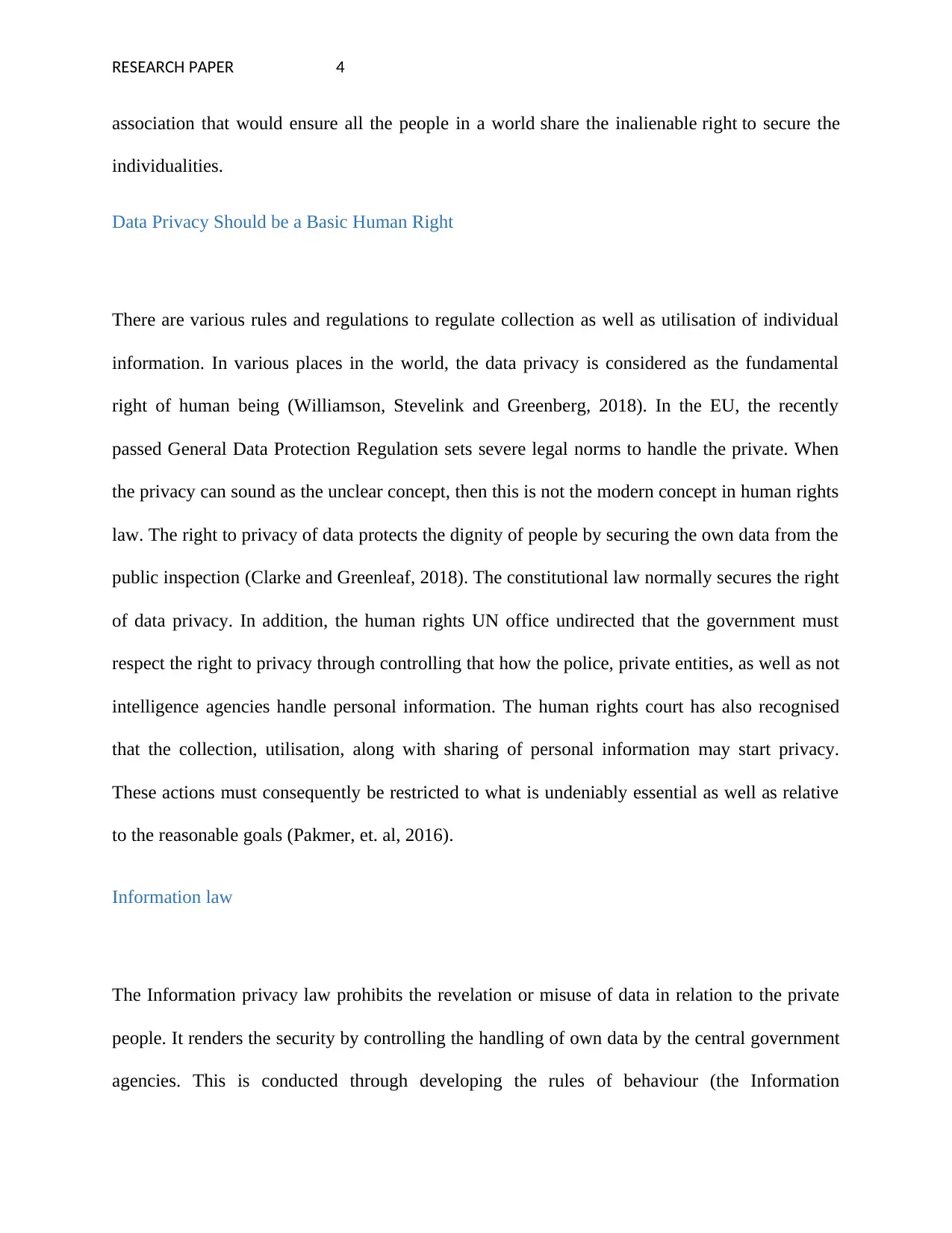
RESEARCH PAPER 4
association that would ensure all the people in a world share the inalienable right to secure the
individualities.
Data Privacy Should be a Basic Human Right
There are various rules and regulations to regulate collection as well as utilisation of individual
information. In various places in the world, the data privacy is considered as the fundamental
right of human being (Williamson, Stevelink and Greenberg, 2018). In the EU, the recently
passed General Data Protection Regulation sets severe legal norms to handle the private. When
the privacy can sound as the unclear concept, then this is not the modern concept in human rights
law. The right to privacy of data protects the dignity of people by securing the own data from the
public inspection (Clarke and Greenleaf, 2018). The constitutional law normally secures the right
of data privacy. In addition, the human rights UN office undirected that the government must
respect the right to privacy through controlling that how the police, private entities, as well as not
intelligence agencies handle personal information. The human rights court has also recognised
that the collection, utilisation, along with sharing of personal information may start privacy.
These actions must consequently be restricted to what is undeniably essential as well as relative
to the reasonable goals (Pakmer, et. al, 2016).
Information law
The Information privacy law prohibits the revelation or misuse of data in relation to the private
people. It renders the security by controlling the handling of own data by the central government
agencies. This is conducted through developing the rules of behaviour (the Information
association that would ensure all the people in a world share the inalienable right to secure the
individualities.
Data Privacy Should be a Basic Human Right
There are various rules and regulations to regulate collection as well as utilisation of individual
information. In various places in the world, the data privacy is considered as the fundamental
right of human being (Williamson, Stevelink and Greenberg, 2018). In the EU, the recently
passed General Data Protection Regulation sets severe legal norms to handle the private. When
the privacy can sound as the unclear concept, then this is not the modern concept in human rights
law. The right to privacy of data protects the dignity of people by securing the own data from the
public inspection (Clarke and Greenleaf, 2018). The constitutional law normally secures the right
of data privacy. In addition, the human rights UN office undirected that the government must
respect the right to privacy through controlling that how the police, private entities, as well as not
intelligence agencies handle personal information. The human rights court has also recognised
that the collection, utilisation, along with sharing of personal information may start privacy.
These actions must consequently be restricted to what is undeniably essential as well as relative
to the reasonable goals (Pakmer, et. al, 2016).
Information law
The Information privacy law prohibits the revelation or misuse of data in relation to the private
people. It renders the security by controlling the handling of own data by the central government
agencies. This is conducted through developing the rules of behaviour (the Information
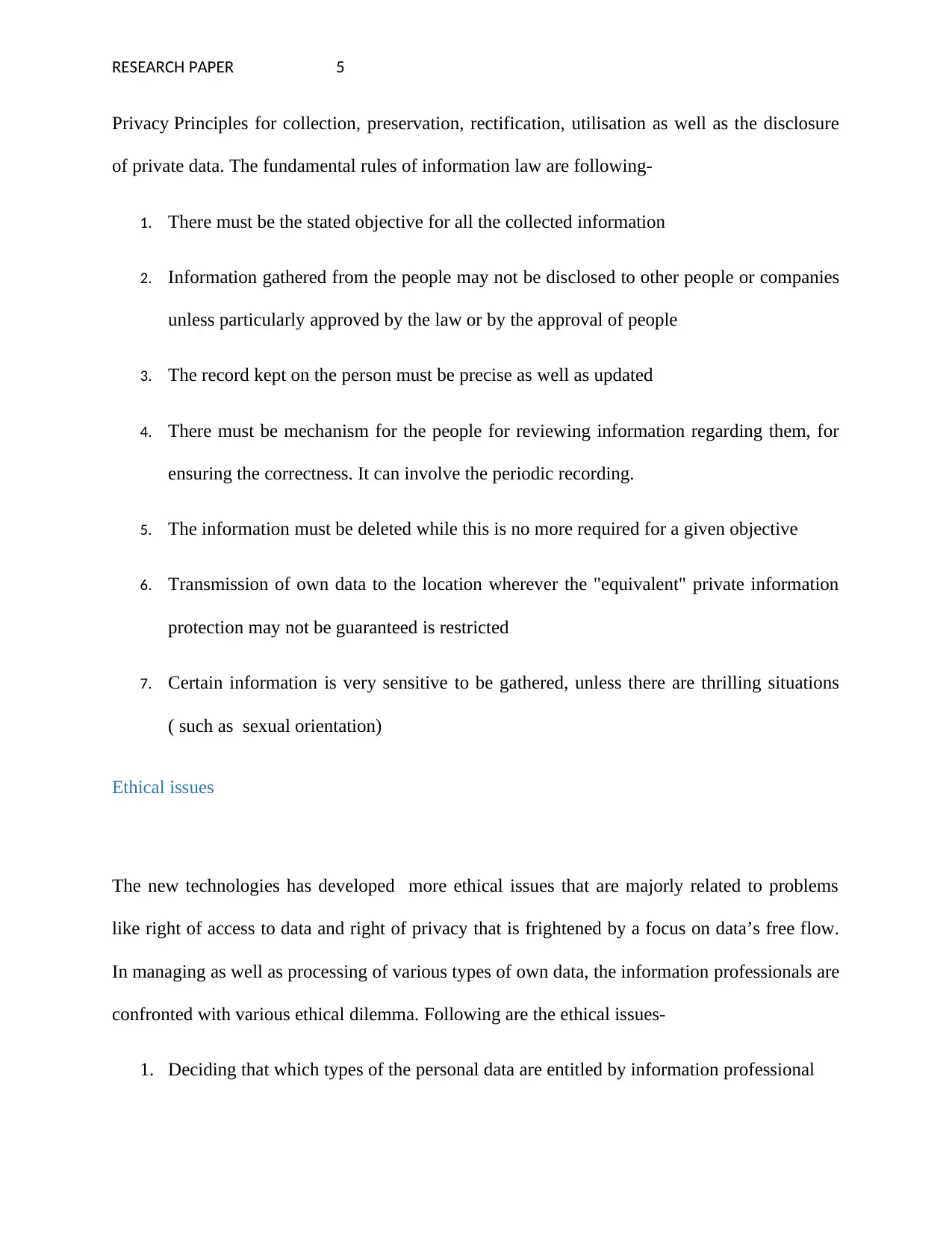
RESEARCH PAPER 5
Privacy Principles for collection, preservation, rectification, utilisation as well as the disclosure
of private data. The fundamental rules of information law are following-
1. There must be the stated objective for all the collected information
2. Information gathered from the people may not be disclosed to other people or companies
unless particularly approved by the law or by the approval of people
3. The record kept on the person must be precise as well as updated
4. There must be mechanism for the people for reviewing information regarding them, for
ensuring the correctness. It can involve the periodic recording.
5. The information must be deleted while this is no more required for a given objective
6. Transmission of own data to the location wherever the "equivalent" private information
protection may not be guaranteed is restricted
7. Certain information is very sensitive to be gathered, unless there are thrilling situations
( such as sexual orientation)
Ethical issues
The new technologies has developed more ethical issues that are majorly related to problems
like right of access to data and right of privacy that is frightened by a focus on data’s free flow.
In managing as well as processing of various types of own data, the information professionals are
confronted with various ethical dilemma. Following are the ethical issues-
1. Deciding that which types of the personal data are entitled by information professional
Privacy Principles for collection, preservation, rectification, utilisation as well as the disclosure
of private data. The fundamental rules of information law are following-
1. There must be the stated objective for all the collected information
2. Information gathered from the people may not be disclosed to other people or companies
unless particularly approved by the law or by the approval of people
3. The record kept on the person must be precise as well as updated
4. There must be mechanism for the people for reviewing information regarding them, for
ensuring the correctness. It can involve the periodic recording.
5. The information must be deleted while this is no more required for a given objective
6. Transmission of own data to the location wherever the "equivalent" private information
protection may not be guaranteed is restricted
7. Certain information is very sensitive to be gathered, unless there are thrilling situations
( such as sexual orientation)
Ethical issues
The new technologies has developed more ethical issues that are majorly related to problems
like right of access to data and right of privacy that is frightened by a focus on data’s free flow.
In managing as well as processing of various types of own data, the information professionals are
confronted with various ethical dilemma. Following are the ethical issues-
1. Deciding that which types of the personal data are entitled by information professional
⊘ This is a preview!⊘
Do you want full access?
Subscribe today to unlock all pages.

Trusted by 1+ million students worldwide
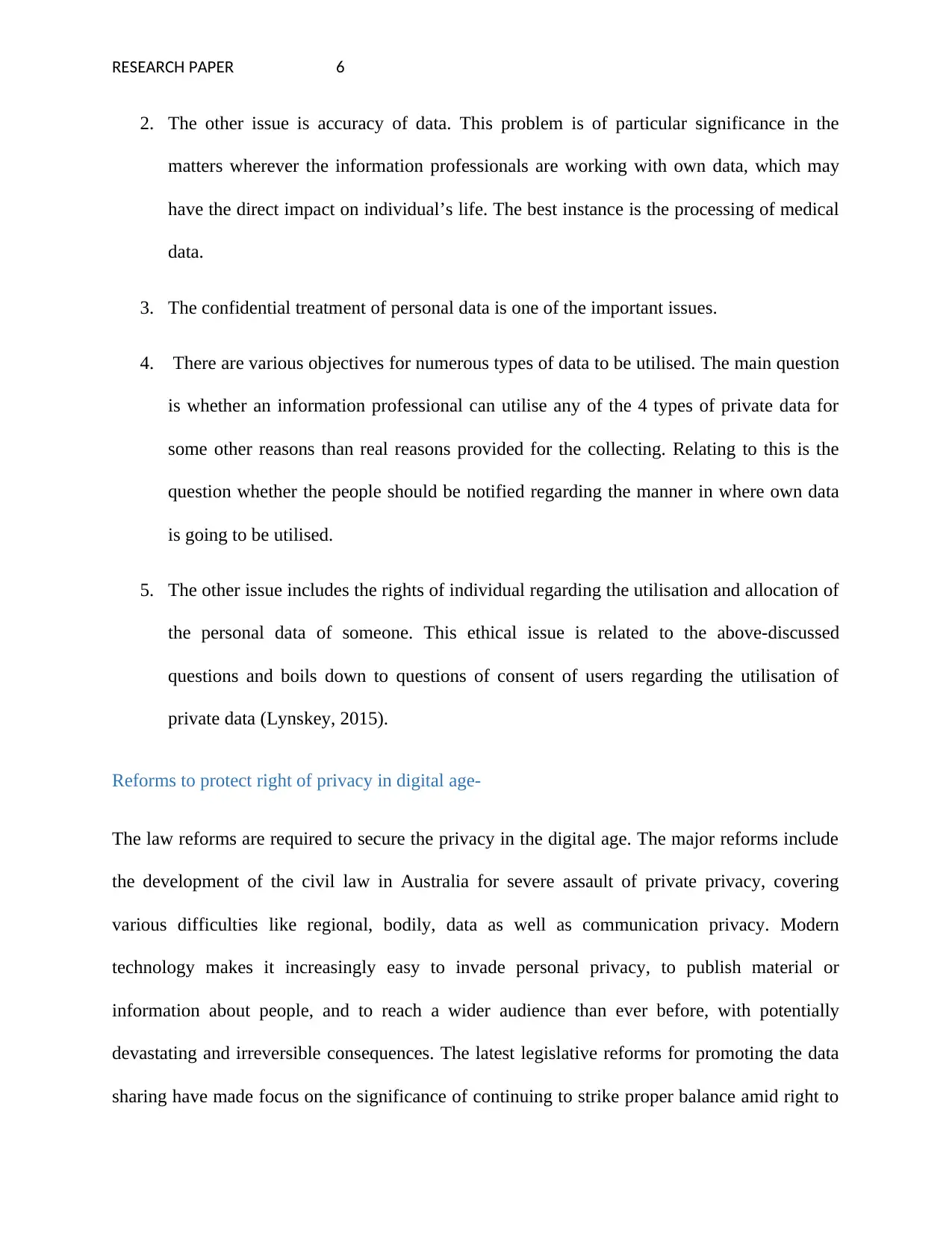
RESEARCH PAPER 6
2. The other issue is accuracy of data. This problem is of particular significance in the
matters wherever the information professionals are working with own data, which may
have the direct impact on individual’s life. The best instance is the processing of medical
data.
3. The confidential treatment of personal data is one of the important issues.
4. There are various objectives for numerous types of data to be utilised. The main question
is whether an information professional can utilise any of the 4 types of private data for
some other reasons than real reasons provided for the collecting. Relating to this is the
question whether the people should be notified regarding the manner in where own data
is going to be utilised.
5. The other issue includes the rights of individual regarding the utilisation and allocation of
the personal data of someone. This ethical issue is related to the above-discussed
questions and boils down to questions of consent of users regarding the utilisation of
private data (Lynskey, 2015).
Reforms to protect right of privacy in digital age-
The law reforms are required to secure the privacy in the digital age. The major reforms include
the development of the civil law in Australia for severe assault of private privacy, covering
various difficulties like regional, bodily, data as well as communication privacy. Modern
technology makes it increasingly easy to invade personal privacy, to publish material or
information about people, and to reach a wider audience than ever before, with potentially
devastating and irreversible consequences. The latest legislative reforms for promoting the data
sharing have made focus on the significance of continuing to strike proper balance amid right to
2. The other issue is accuracy of data. This problem is of particular significance in the
matters wherever the information professionals are working with own data, which may
have the direct impact on individual’s life. The best instance is the processing of medical
data.
3. The confidential treatment of personal data is one of the important issues.
4. There are various objectives for numerous types of data to be utilised. The main question
is whether an information professional can utilise any of the 4 types of private data for
some other reasons than real reasons provided for the collecting. Relating to this is the
question whether the people should be notified regarding the manner in where own data
is going to be utilised.
5. The other issue includes the rights of individual regarding the utilisation and allocation of
the personal data of someone. This ethical issue is related to the above-discussed
questions and boils down to questions of consent of users regarding the utilisation of
private data (Lynskey, 2015).
Reforms to protect right of privacy in digital age-
The law reforms are required to secure the privacy in the digital age. The major reforms include
the development of the civil law in Australia for severe assault of private privacy, covering
various difficulties like regional, bodily, data as well as communication privacy. Modern
technology makes it increasingly easy to invade personal privacy, to publish material or
information about people, and to reach a wider audience than ever before, with potentially
devastating and irreversible consequences. The latest legislative reforms for promoting the data
sharing have made focus on the significance of continuing to strike proper balance amid right to
Paraphrase This Document
Need a fresh take? Get an instant paraphrase of this document with our AI Paraphraser
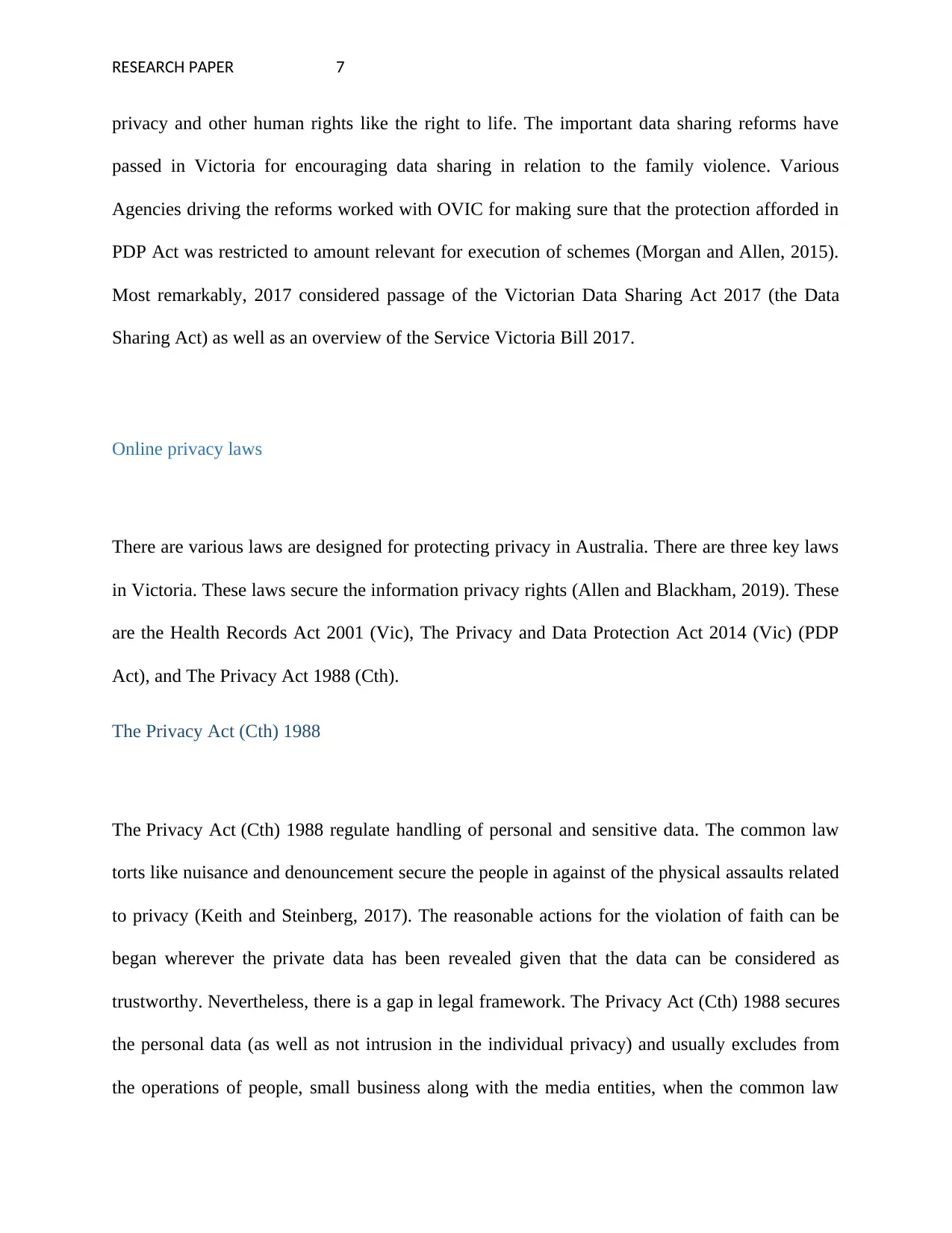
RESEARCH PAPER 7
privacy and other human rights like the right to life. The important data sharing reforms have
passed in Victoria for encouraging data sharing in relation to the family violence. Various
Agencies driving the reforms worked with OVIC for making sure that the protection afforded in
PDP Act was restricted to amount relevant for execution of schemes (Morgan and Allen, 2015).
Most remarkably, 2017 considered passage of the Victorian Data Sharing Act 2017 (the Data
Sharing Act) as well as an overview of the Service Victoria Bill 2017.
Online privacy laws
There are various laws are designed for protecting privacy in Australia. There are three key laws
in Victoria. These laws secure the information privacy rights (Allen and Blackham, 2019). These
are the Health Records Act 2001 (Vic), The Privacy and Data Protection Act 2014 (Vic) (PDP
Act), and The Privacy Act 1988 (Cth).
The Privacy Act (Cth) 1988
The Privacy Act (Cth) 1988 regulate handling of personal and sensitive data. The common law
torts like nuisance and denouncement secure the people in against of the physical assaults related
to privacy (Keith and Steinberg, 2017). The reasonable actions for the violation of faith can be
began wherever the private data has been revealed given that the data can be considered as
trustworthy. Nevertheless, there is a gap in legal framework. The Privacy Act (Cth) 1988 secures
the personal data (as well as not intrusion in the individual privacy) and usually excludes from
the operations of people, small business along with the media entities, when the common law
privacy and other human rights like the right to life. The important data sharing reforms have
passed in Victoria for encouraging data sharing in relation to the family violence. Various
Agencies driving the reforms worked with OVIC for making sure that the protection afforded in
PDP Act was restricted to amount relevant for execution of schemes (Morgan and Allen, 2015).
Most remarkably, 2017 considered passage of the Victorian Data Sharing Act 2017 (the Data
Sharing Act) as well as an overview of the Service Victoria Bill 2017.
Online privacy laws
There are various laws are designed for protecting privacy in Australia. There are three key laws
in Victoria. These laws secure the information privacy rights (Allen and Blackham, 2019). These
are the Health Records Act 2001 (Vic), The Privacy and Data Protection Act 2014 (Vic) (PDP
Act), and The Privacy Act 1988 (Cth).
The Privacy Act (Cth) 1988
The Privacy Act (Cth) 1988 regulate handling of personal and sensitive data. The common law
torts like nuisance and denouncement secure the people in against of the physical assaults related
to privacy (Keith and Steinberg, 2017). The reasonable actions for the violation of faith can be
began wherever the private data has been revealed given that the data can be considered as
trustworthy. Nevertheless, there is a gap in legal framework. The Privacy Act (Cth) 1988 secures
the personal data (as well as not intrusion in the individual privacy) and usually excludes from
the operations of people, small business along with the media entities, when the common law
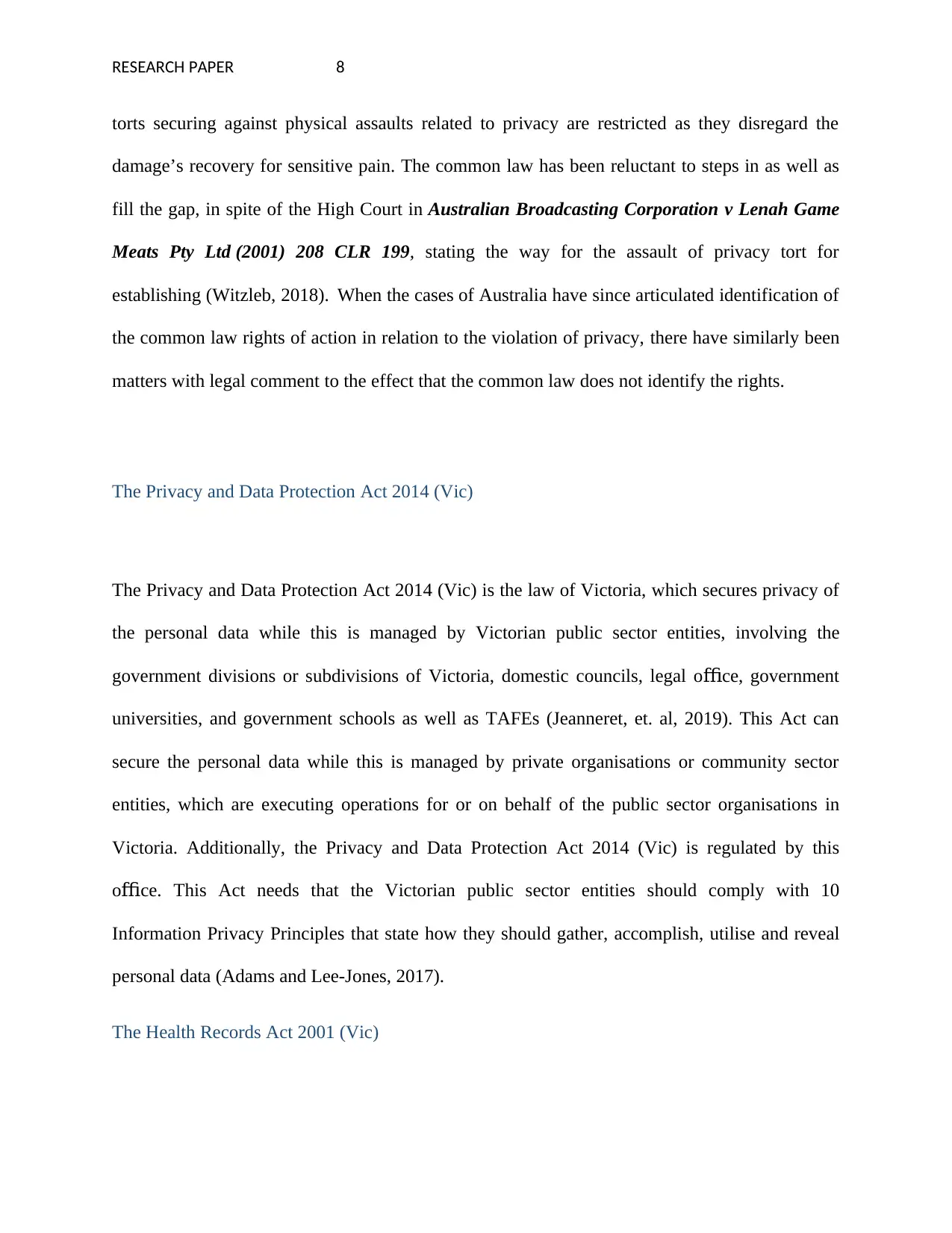
RESEARCH PAPER 8
torts securing against physical assaults related to privacy are restricted as they disregard the
damage’s recovery for sensitive pain. The common law has been reluctant to steps in as well as
fill the gap, in spite of the High Court in Australian Broadcasting Corporation v Lenah Game
Meats Pty Ltd (2001) 208 CLR 199, stating the way for the assault of privacy tort for
establishing (Witzleb, 2018). When the cases of Australia have since articulated identification of
the common law rights of action in relation to the violation of privacy, there have similarly been
matters with legal comment to the effect that the common law does not identify the rights.
The Privacy and Data Protection Act 2014 (Vic)
The Privacy and Data Protection Act 2014 (Vic) is the law of Victoria, which secures privacy of
the personal data while this is managed by Victorian public sector entities, involving the
government divisions or subdivisions of Victoria, domestic councils, legal o ce, governmentffi
universities, and government schools as well as TAFEs (Jeanneret, et. al, 2019). This Act can
secure the personal data while this is managed by private organisations or community sector
entities, which are executing operations for or on behalf of the public sector organisations in
Victoria. Additionally, the Privacy and Data Protection Act 2014 (Vic) is regulated by this
o ce. This Act needs that the Victorian public sector entities should comply with 10ffi
Information Privacy Principles that state how they should gather, accomplish, utilise and reveal
personal data (Adams and Lee‐Jones, 2017).
The Health Records Act 2001 (Vic)
torts securing against physical assaults related to privacy are restricted as they disregard the
damage’s recovery for sensitive pain. The common law has been reluctant to steps in as well as
fill the gap, in spite of the High Court in Australian Broadcasting Corporation v Lenah Game
Meats Pty Ltd (2001) 208 CLR 199, stating the way for the assault of privacy tort for
establishing (Witzleb, 2018). When the cases of Australia have since articulated identification of
the common law rights of action in relation to the violation of privacy, there have similarly been
matters with legal comment to the effect that the common law does not identify the rights.
The Privacy and Data Protection Act 2014 (Vic)
The Privacy and Data Protection Act 2014 (Vic) is the law of Victoria, which secures privacy of
the personal data while this is managed by Victorian public sector entities, involving the
government divisions or subdivisions of Victoria, domestic councils, legal o ce, governmentffi
universities, and government schools as well as TAFEs (Jeanneret, et. al, 2019). This Act can
secure the personal data while this is managed by private organisations or community sector
entities, which are executing operations for or on behalf of the public sector organisations in
Victoria. Additionally, the Privacy and Data Protection Act 2014 (Vic) is regulated by this
o ce. This Act needs that the Victorian public sector entities should comply with 10ffi
Information Privacy Principles that state how they should gather, accomplish, utilise and reveal
personal data (Adams and Lee‐Jones, 2017).
The Health Records Act 2001 (Vic)
⊘ This is a preview!⊘
Do you want full access?
Subscribe today to unlock all pages.

Trusted by 1+ million students worldwide
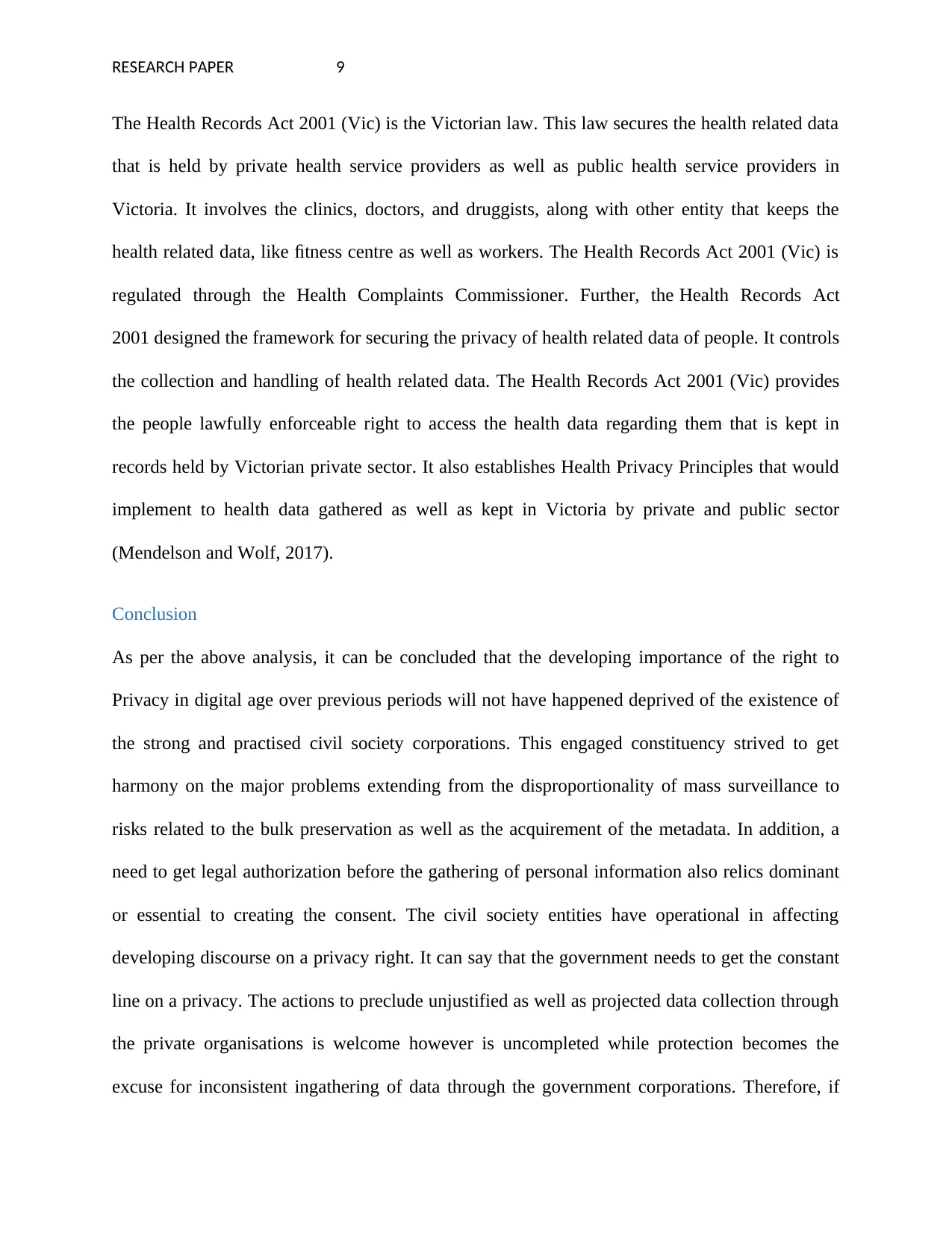
RESEARCH PAPER 9
The Health Records Act 2001 (Vic) is the Victorian law. This law secures the health related data
that is held by private health service providers as well as public health service providers in
Victoria. It involves the clinics, doctors, and druggists, along with other entity that keeps the
health related data, like fitness centre as well as workers. The Health Records Act 2001 (Vic) is
regulated through the Health Complaints Commissioner. Further, the Health Records Act
2001 designed the framework for securing the privacy of health related data of people. It controls
the collection and handling of health related data. The Health Records Act 2001 (Vic) provides
the people lawfully enforceable right to access the health data regarding them that is kept in
records held by Victorian private sector. It also establishes Health Privacy Principles that would
implement to health data gathered as well as kept in Victoria by private and public sector
(Mendelson and Wolf, 2017).
Conclusion
As per the above analysis, it can be concluded that the developing importance of the right to
Privacy in digital age over previous periods will not have happened deprived of the existence of
the strong and practised civil society corporations. This engaged constituency strived to get
harmony on the major problems extending from the disproportionality of mass surveillance to
risks related to the bulk preservation as well as the acquirement of the metadata. In addition, a
need to get legal authorization before the gathering of personal information also relics dominant
or essential to creating the consent. The civil society entities have operational in affecting
developing discourse on a privacy right. It can say that the government needs to get the constant
line on a privacy. The actions to preclude unjustified as well as projected data collection through
the private organisations is welcome however is uncompleted while protection becomes the
excuse for inconsistent ingathering of data through the government corporations. Therefore, if
The Health Records Act 2001 (Vic) is the Victorian law. This law secures the health related data
that is held by private health service providers as well as public health service providers in
Victoria. It involves the clinics, doctors, and druggists, along with other entity that keeps the
health related data, like fitness centre as well as workers. The Health Records Act 2001 (Vic) is
regulated through the Health Complaints Commissioner. Further, the Health Records Act
2001 designed the framework for securing the privacy of health related data of people. It controls
the collection and handling of health related data. The Health Records Act 2001 (Vic) provides
the people lawfully enforceable right to access the health data regarding them that is kept in
records held by Victorian private sector. It also establishes Health Privacy Principles that would
implement to health data gathered as well as kept in Victoria by private and public sector
(Mendelson and Wolf, 2017).
Conclusion
As per the above analysis, it can be concluded that the developing importance of the right to
Privacy in digital age over previous periods will not have happened deprived of the existence of
the strong and practised civil society corporations. This engaged constituency strived to get
harmony on the major problems extending from the disproportionality of mass surveillance to
risks related to the bulk preservation as well as the acquirement of the metadata. In addition, a
need to get legal authorization before the gathering of personal information also relics dominant
or essential to creating the consent. The civil society entities have operational in affecting
developing discourse on a privacy right. It can say that the government needs to get the constant
line on a privacy. The actions to preclude unjustified as well as projected data collection through
the private organisations is welcome however is uncompleted while protection becomes the
excuse for inconsistent ingathering of data through the government corporations. Therefore, if
Paraphrase This Document
Need a fresh take? Get an instant paraphrase of this document with our AI Paraphraser
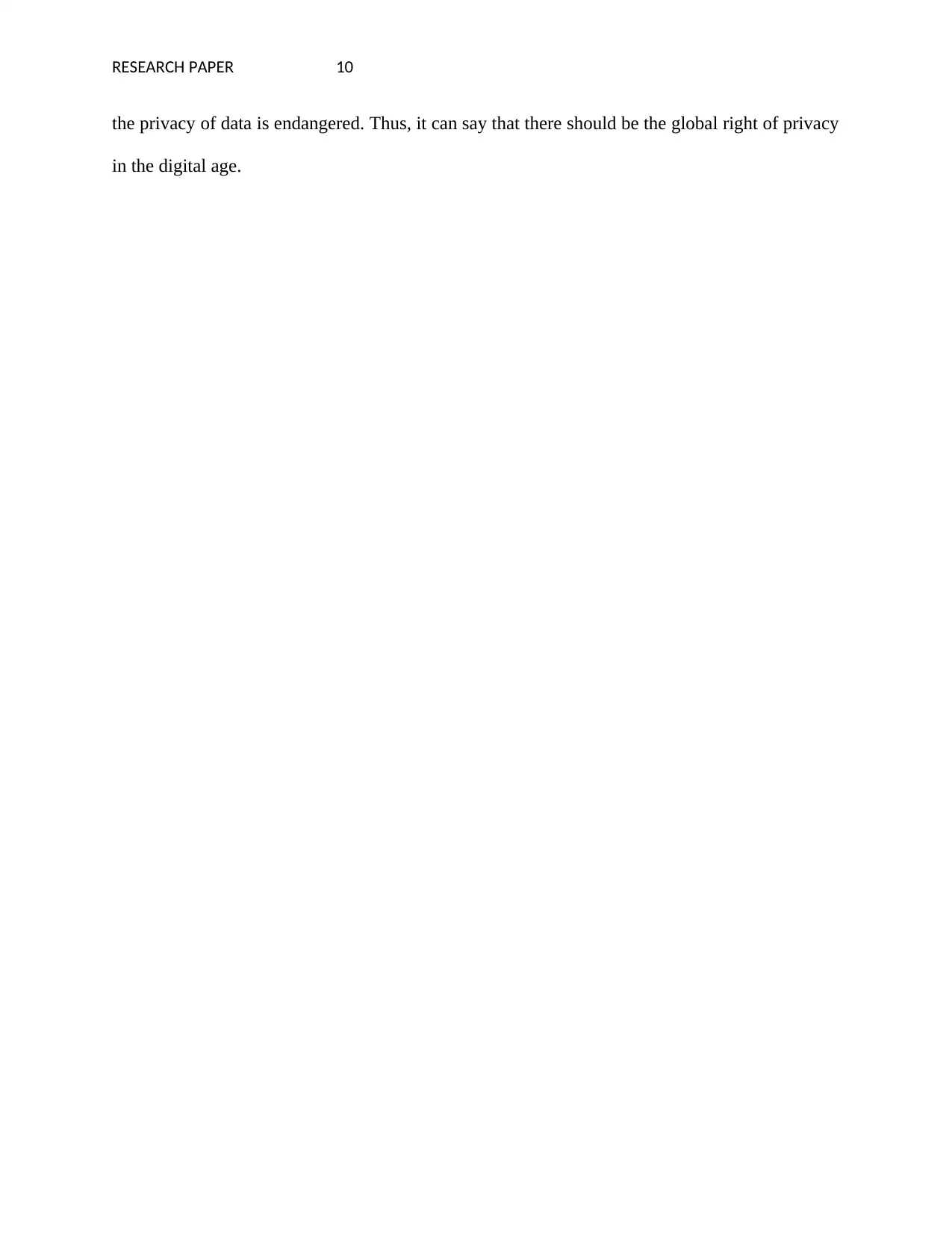
RESEARCH PAPER 10
the privacy of data is endangered. Thus, it can say that there should be the global right of privacy
in the digital age.
the privacy of data is endangered. Thus, it can say that there should be the global right of privacy
in the digital age.
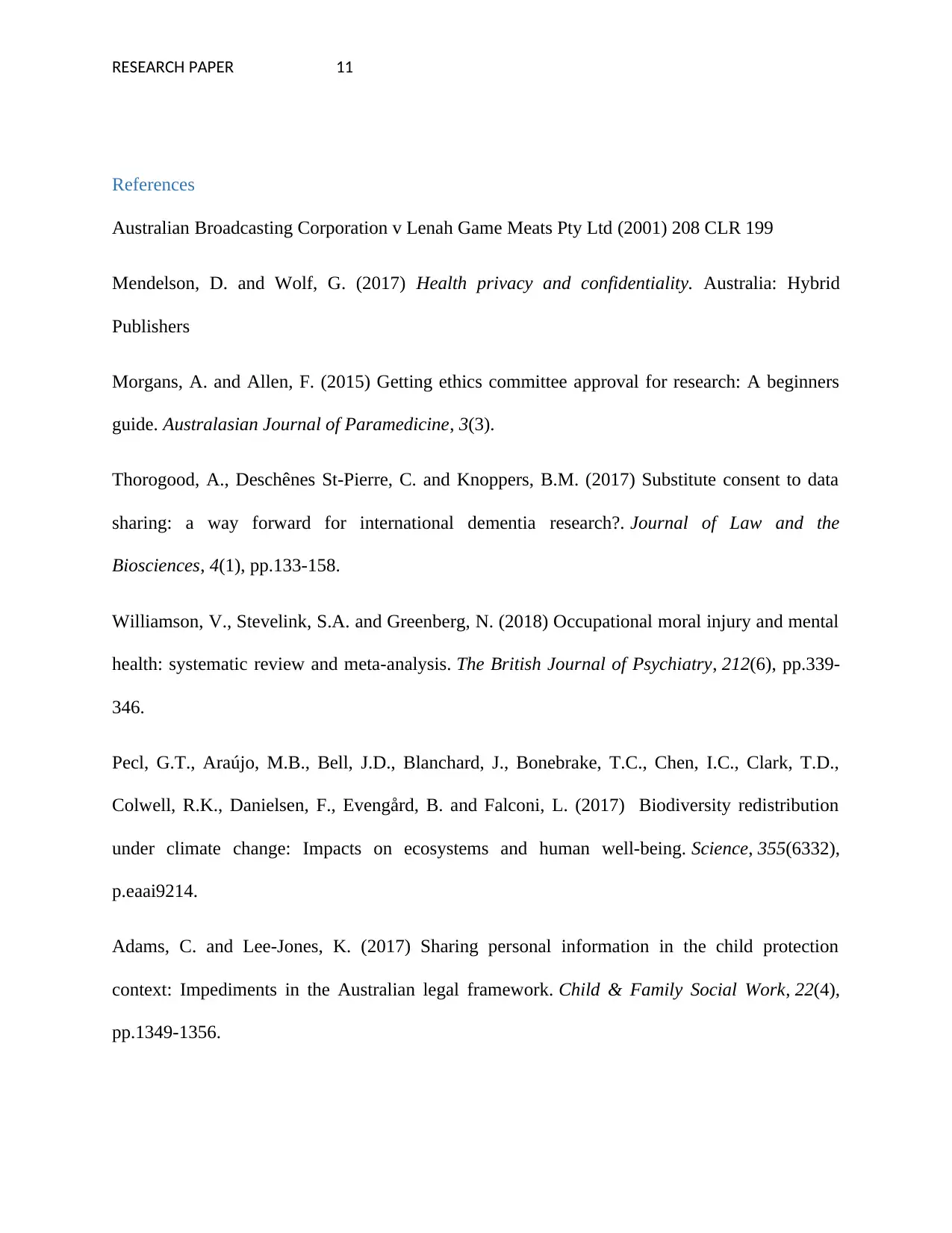
RESEARCH PAPER 11
References
Australian Broadcasting Corporation v Lenah Game Meats Pty Ltd (2001) 208 CLR 199
Mendelson, D. and Wolf, G. (2017) Health privacy and confidentiality. Australia: Hybrid
Publishers
Morgans, A. and Allen, F. (2015) Getting ethics committee approval for research: A beginners
guide. Australasian Journal of Paramedicine, 3(3).
Thorogood, A., Deschênes St-Pierre, C. and Knoppers, B.M. (2017) Substitute consent to data
sharing: a way forward for international dementia research?. Journal of Law and the
Biosciences, 4(1), pp.133-158.
Williamson, V., Stevelink, S.A. and Greenberg, N. (2018) Occupational moral injury and mental
health: systematic review and meta-analysis. The British Journal of Psychiatry, 212(6), pp.339-
346.
Pecl, G.T., Araújo, M.B., Bell, J.D., Blanchard, J., Bonebrake, T.C., Chen, I.C., Clark, T.D.,
Colwell, R.K., Danielsen, F., Evengård, B. and Falconi, L. (2017) Biodiversity redistribution
under climate change: Impacts on ecosystems and human well-being. Science, 355(6332),
p.eaai9214.
Adams, C. and Lee‐Jones, K. (2017) Sharing personal information in the child protection
context: Impediments in the Australian legal framework. Child & Family Social Work, 22(4),
pp.1349-1356.
References
Australian Broadcasting Corporation v Lenah Game Meats Pty Ltd (2001) 208 CLR 199
Mendelson, D. and Wolf, G. (2017) Health privacy and confidentiality. Australia: Hybrid
Publishers
Morgans, A. and Allen, F. (2015) Getting ethics committee approval for research: A beginners
guide. Australasian Journal of Paramedicine, 3(3).
Thorogood, A., Deschênes St-Pierre, C. and Knoppers, B.M. (2017) Substitute consent to data
sharing: a way forward for international dementia research?. Journal of Law and the
Biosciences, 4(1), pp.133-158.
Williamson, V., Stevelink, S.A. and Greenberg, N. (2018) Occupational moral injury and mental
health: systematic review and meta-analysis. The British Journal of Psychiatry, 212(6), pp.339-
346.
Pecl, G.T., Araújo, M.B., Bell, J.D., Blanchard, J., Bonebrake, T.C., Chen, I.C., Clark, T.D.,
Colwell, R.K., Danielsen, F., Evengård, B. and Falconi, L. (2017) Biodiversity redistribution
under climate change: Impacts on ecosystems and human well-being. Science, 355(6332),
p.eaai9214.
Adams, C. and Lee‐Jones, K. (2017) Sharing personal information in the child protection
context: Impediments in the Australian legal framework. Child & Family Social Work, 22(4),
pp.1349-1356.
⊘ This is a preview!⊘
Do you want full access?
Subscribe today to unlock all pages.

Trusted by 1+ million students worldwide
1 out of 14
Related Documents
Your All-in-One AI-Powered Toolkit for Academic Success.
+13062052269
info@desklib.com
Available 24*7 on WhatsApp / Email
![[object Object]](/_next/static/media/star-bottom.7253800d.svg)
Unlock your academic potential
Copyright © 2020–2026 A2Z Services. All Rights Reserved. Developed and managed by ZUCOL.





